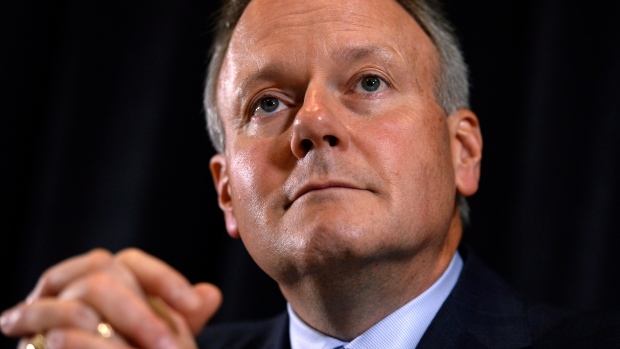Sep 20, 2016
Poloz signals interest rates to stay low as economy faces headwinds
, Reuters

QUEBEC CITY - Canadian interest rates will stay low for longer as the economy faces strong headwinds and business investment is weaker than expected, but government spending on infrastructure will help growth, Bank of Canada Governor Stephen Poloz said on Tuesday.
In a speech suggesting the central bank will remain on the sidelines even as the economy struggles to gain traction, Poloz said businesses need to adjust their expectations for return on investment given the low interest rate environment.
"There is no smoking gun to suggest that the bank is ready to provide more stimulus here. They acknowledge that there are significant headwinds that require in exchange very stimulative monetary policy," said David Tulk, chief Canada macro strategist at TD Securities.
"But it's more just of the view that this is the environment we are sitting in as opposed to saying we need to do something about it," Tulk said.
Canada, a major oil exporter, was hit by the slump in crude prices last year and has struggled to sustainably regain economic momentum since a brief recession in 2015. Wildfires in northern Alberta dealt another blow to growth this year, leading the economy to shrink in the second quarter at the steepest rate since the global financial crisis.
The Bank of Canada, which cut rates twice last year, is hopeful the challenges are temporary and that stronger demand from the United States and a lower Canadian dollar will help revive Canada's export sector.
The Canadian currency firmed slightly against the U.S. dollar after Poloz's speech to economists in Quebec City was released, trading at $1.3220. It was $1.3232 before the speech.
FISCAL STIMULUS
Poloz said it is obvious the economy continues to be buffeted by strong headwinds and needs stimulative monetary policy to counteract them and move closer to full capacity, but he put the onus on business and government to spark growth.
"We also need to watch the full effects of the government's fiscal stimulus unfold," he said.
Canada's Liberal government, which came to power last November, expects to run a budget deficit for the 2016-2017 fiscal year as it spends on infrastructure and other measures in a bid to stimulate the economy.
Poloz urged corporations to adjust the hurdle for new investment, saying it has been weaker than expected because some firms aren't taking the low rate environment into account when deciding if an investment is worthwhile.
The governor said that while companies were uncertain about future demand prospects, they should not expect the kind of returns they could get before the financial crisis.
"My response has been to say that in the current and prospective environment, 4 per cent will probably turn out to be a pretty good return," Poloz said.
"Businesses need to make sure their expectations about investment returns reflect the current and likely future reality and reconfigure their investment plans accordingly."
Poloz said accommodative monetary policy is not as stimulative as it would have been before the crisis.
"Put simply, we're dealing with lower for longer, not lower forever ... we cannot just sit back and wait for these slow-moving forces to reverse," he said.
To ensure an adequate retirement, Poloz suggested Canadians consider saving more, working longer than planned and changing their investment mix to adjust to the persistently low interest rates. The need is compounded by the fact Canadians are living longer.
With files from The Canadian Press
